There is perhaps an over-simplistic argument doing the rounds in the industry at present that Driver Only Operation (DOO) is simply about cost-cutting in an age of austerity - and a need for Britain’s passenger railway to provide value for money.
There is a second argument in favour of retaining guards to protect jobs, to enhance passenger convenience and security, and for revenue protection.
Mick Whelan, general secretary of train drivers’ union ASLEF, says safety is his biggest concern.
“We won’t be supporting it on the Great Western or any Northern train operating company,” he tells RAIL.
That view was endorsed democratically by Whelan’s membership in May, at ASLEF’s Annual Assembly of Delegates in Southend. A motion instructed ASLEF’s executive committee “to actively seek ways to stop any further DOO negotiations and to return all trains to a minimum of a two-person crew (Driver and Guard/Conductor)”, while at the same time “honouring previously negotiated agreements”.
ASLEF President Tosh McDonald affirmed the conference’s view: “There will be no extension of Driver Only Operation,” he told delegates.
McDonald was later supported by the leader of another major rail union, RMT General Secretary Mick Cash, who wanted to place on record his thanks to ASLEF for the “principled position” the union had taken on Driver Only Operation. In typically robust RMT fashion, Cash added: “The employers want to divide and degrade, and reduce our terms and conditions.”
The Department for Transport has made it clear that it wants a significant expansion of Driver Only Operation, introducing it on the Northern and Great Western franchises, and thus putting it at loggerheads with the expressed positions of Britain’s biggest rail unions.
But the picture is not as straightforward as it sounds - indeed, the circumstances surrounding the introduction of DOO (or not, as the case may be) have changed over the years.
Back in the 1960s, in an era of Beeching cuts (and of further cuts inspired by Beeching), the residual low-traffic rural lines were not always economically viable. And so, under a general de-staffing trend, British Rail established the concept of DMU-operated ‘Paytrains’ to offset the closure of ticket offices on lightly loaded branch lines.
The Paytrains were staffed with a Driver and Guard. But in an era of full employment, when relatively low-paid train guards could be enticed by jobs elsewhere, BR found it increasingly difficult to recruit and retain staff.
That led to the role of on-train staff changing over the years - but the driver could never be expected to undertake the task of revenue collection and selling fares, even on the most lightly-used service.
It’s also no secret that those still performing the traditional operational role of a guard in this new era did not always display great enthusiasm for collecting fares.
Fast forward to the present day. While many rural ticket offices have closed, the post-BR privatised industry has introduced a host of off-train ticketing options (online, at ticket machines, on mobile phones).
This means that there is rarely an excuse for a passenger to climb aboard a train without having already bought a ticket. And particularly at major stations, an increasing number of gatelines have also been introduced, preventing platform access without a ticket and thus protecting revenue.
Would, therefore, a driver be able to carry out the duties previously performed by a guard, such as opening and closing doors?
With more sharply focused commercial incentives in the privatised era, Driver Only Operation first became widespread in the 1990s, having first been introduced on the Bedford-St Pancras (‘Bedpan’) line in 1982.
And with increased pressure to run more trains, operators have since adapted the role of on-train staff, to the extent that there are now many variations even on services that are operationally very similar.
For example, all South West Trains services retain the visible presence of a guard - primarily for safety and operational reasons, as opposed to revenue collection.
But what’s true for trains out of London Waterloo isn’t necessarily true for those out of London Victoria or London Bridge. Southern spokesman Chris Hudson clarifies that its Metro, Gatwick Express and Brighton Express services are DOO, while all the rest have conductors.
Whichever option is chosen, it appears to work for the individual operator concerned, providing a large number of services on one of the most intensively used rail networks in the world.
“DOO has to be a good thing as it does confine safety-critical work to the driver,” one senior industry source tells RAIL, as the operational safety of the train is concentrated on one person.
“There is no reason why the driver cannot open and close the doors. And provided you’ve got the driver, you’ve got the train.”
However, in the 20 years since the widespread introduction of DOO, the expectations of passengers for operators to do more to improve their travelling experience and personal safety have changed.
While a 12-car DOO train is entirely normal on the busy commuter route between King’s Cross and Peterborough - indeed, on both its Thameslink and Great Northern routes, Govia Thameslink Railway confirmed that it runs an entirely DOO operation - there remain (even in the eyes of the most ardent DOO supporters) security risks for the train’s passengers without another member of staff present, be they called guards, conductors or train managers.
That role doesn’t necessarily entail the second member of staff going out on the track and laying detonators, in the way that it might have been done in the past, but it remains an important one.
ASLEF’s view is that the driver’s domain should be strictly the cab, and nowhere else on the train. Says McDonald: “The view is that there’s an awful lot going on in the cab these days. And it’s a safety consideration that there’s a second person on the train.”
Experienced drivers bear out this safety concern. Without seeking either a positive or a negative view, RAIL asked drivers to anonymously express their feelings about DOO.
One speculated on what might happen if a driver was killed or incapacitated on a busy main line service, perhaps by an object coming through the windscreen and impaling him before he has the chance to hit the all-important emergency red button in the cab.
While the train would come to a halt following the automatic intervention of the Driver’s Safety Device, the train might sit stationary, packed full of hot and angry passengers receiving no information as to why the train had stopped.
“It won’t take long before somebody pulls an emergency door release and people spill out onto the track, only to be mown down by passing trains that haven’t been alerted because all the signaller has deduced is that a service has been a long time in section,” said our correspondent.
Such a scenario is not perhaps wild speculation, given that train drivers are only human and just as susceptible to sudden ill health as everyone else. And things can go wrong in the cab, in remote spots away from any other human contact.
McDonald recalls a recent incident involving a freight train driver: “He went into one signal section between two towns, but never came out the other end.”
Found slumped alone over the controls in his cab, it took 40 minutes for paramedics to arrive: “There was nobody to assist him on the train.”
The story of the freight driver, who sadly died, raises the question of what might happen on a DOO passenger train in that situation. Bar the absence of a locked unglazed partition between driver and passengers, who would know if the driver genuinely needs urgent medical help, or has merely been stopped at a red signal for a particularly long time without an announcement, leaving passengers none the wiser and potentially at serious risk?
Some people working in the rail industry believe DOO has become widespread simply because it is pure chance that there have been no major accidents in which DOO has been cited as a factor.
Indeed, Britain’s railway currently has the proud record of being the safest in Europe, with no accidental passenger fatalities involving a train crash since 2007, although there is plenty of evidence that post-Hatfield, the overall industry culture has put safety first and foremost, thus greatly reducing the possibility of any sort of accident.
“We haven’t been shocked by a DOO-exacerbated accident. We are giving it too much of an easy ride when weighing up its pros and cons,” says a driver who works both under DOO and with a guard.
Then there are technical and financial considerations - for the train operators and Network Rail, introducing DOO is not merely a matter of removing the guard.
There is a cost involved when taking control away from the driver and fitting guard-operated controls to open and close doors, particularly in older BR-built stock (as Northern Rail found out when it took on a fleet of Class 319 EMUs from Thameslink). Likewise, there is a cost in reversing that process and putting the responsibility in the hands of the driver.
As a pre-requisite, cab secure radio is also legally required. And where DOO trains operate at stations in and around London in particular, a series of mirrors and monitors are necessary to ensure that the driver has sufficient vision of the longest trains to ensure no passenger is trapped in the doors - broadly the ‘Platform Train Interface’ (the new term introduced by the Rail Safety and Standards Board and Network Rail).
From a broader economic perspective, McDonald feels that wider objectives are being lost - for example, in the north of England, where Chancellor George Osborne is attempting to create his Northern Powerhouse.
“To cut jobs on the railway is cutting, rather than investing,” says McDonald, who points out DOO would lead to more people unemployed in an area already with historically high levels of unemployment.
That seems obvious, unless the grand schemes of the Northern Powerhouse are expected to transfer jobs away from the railway and into other industries.
McDonald adds: “To get Northern trains to the standard of DOO would cost a fortune.”
RAIL’s industry source supports that view: “On low density routes, the infrastructure investment is needed. If you have somebody in the train, the business case for cab secure radio tends to disappear.”
But he nevertheless supports the DfT view that DOO should be extended, saying: “There are a number of Northern routes that could support DOO.”
The Department is hoping for a target of around 50%, and although it’s not clear which routes it has in mind, it may be that any new trains ordered by the next franchise holder are equipped this technical capability from the outset.
Any case for DOO could be undermined further by other industry trends, such as the growth in demand for assisted travel. In other words, even if the driver is able to command the safe operation of the train as far as able-bodied passengers are concerned, those requiring extra help - such as needing a ramp for a wheelchair - would require station staff to be present. A driver can hardly be expected to leave the cab to undertake such tasks.
With passenger numbers continuing to rise, there can be no doubt that demands on rail staff will increase, if the railway is not to become a vastly more de-staffed and de-humanised environment.
If that trend continues, even in these times of tight budgets and lower public subsidy, might extending DOO further create more problems than it solves?
- This feature was published in RAIL 777 on June 24 2015

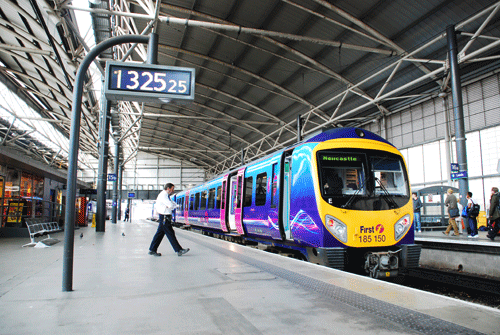
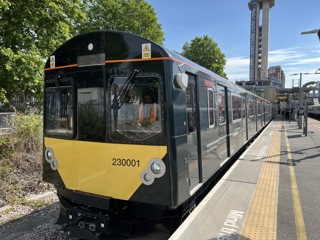
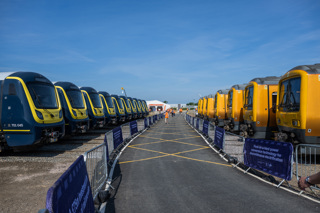
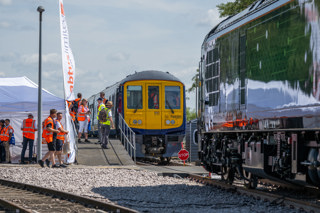

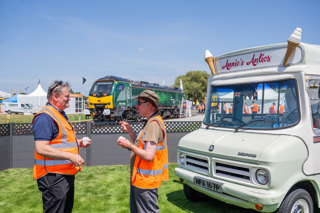







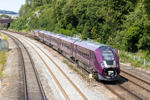



David Smith (ex Train Crew Manager) - 24/11/2015 19:11
The traditional "guard" and his or her role are as dead as the dodo. DOO is perfectly safe and has been since the middle 1980s. "Guards", on HSTs, have never controlled the opening and closing of doors. They have simply operated the central locking mechanism after arrival and before departure. The new IEP trains are designed to enable the driver to open and close the door and this is how it should be. As far as I can see, there is no intention to remove the on train presence of suitable members of staff but they should not be carrying out the role of the traditional guard, whose role has been considerably diluted over the years and now has reached the end of its useful life.